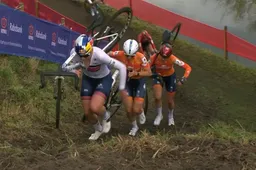UCI stopped in its tracks by Belgian institute during maximum gearing test, SRAM gets the last laugh
CyclingFriday, 10 October 2025 at 09:26

The UCI had been showing it off for months, but the test to test a limit on the gear ratio of cycling teams in the Tour of Guangxi in October has been blocked by the Belgian Competition Authority (BMA). The cycling association itself issued a press release on Thursday evening, explaining that there will be no maximum gearing test in China.
ADVERTISEMENT
According to the UCI, the so-called "Maximum Gearing Test Protocol" was intended to provide initial insight into whether smaller gears in the cycling peloton lead to greater safety. In recent years, some cycling teams have complained about the ever-increasing speeds in the pack, caused by ever faster equipment and larger gears.
In the Tour of Guangxi, organized from October 14 to 19, the UCI wanted to test a limit on gear ratios. Equipment supplier SRAM, the manufacturer of the SRAM RED AXS, with 54 teeth at the front and 10 sprockets at the rear, appealed against this intention. Many teams use this system, but the UCI wanted to test with a maximum of 54 teeth at the front and 11 sprockets at the rear.
ADVERTISEMENT
Continue reading below the photo

UCI does not understand BMA's intervention
ADVERTISEMENT
SRAM did not think the test was such a good idea, and was proven right by Belgium. “The UCI expresses its surprise at the intervention of a competition authority on a subject desired by all stakeholders of cycling, the scope of which was limited to analysing the effects that limiting gear ratios may have on riders’ speed and therefore on safety.”
"The decision was taken by a Belgian authority responding to a complaint from a US company against a Swiss sports association regarding a test to be carried out on Chinese territory," the UCI summarised. It states outright that SRAM's complaint is not about the safety of riders as a ‘shared objective’.
The cycling federation is appealing, but it remains to be seen whether this will achieve anything. The disqualification of five teams in women's cycling earlier this year highlighted the difficulty of this issue. "Changes may also be made to the Testing Protocol to allow for the implementation of the tests desired by all stakeholders in professional road cycling."
Read also
IDL-productions

Vacancy: Growth Editor IDL Procycling - (native) English

“Interviews showed we were close to cracking him”; Visma | LaB take hope from Pogacar’s Tour comments

After European Championship podium with Evenepoel and Ganna: how high is the ceiling for Unibet Rose Rockets’ new “steam train”?

Tour of Oman 2026 | Visma | Lease a Bike and UAE’s ‘sherpas’ take up the challenge

Winning machine Wiebes may get fewer chances at SD Worx-Protime after dream year
Latest Cycling News

Vacancy: Growth Editor IDL Procycling - (native) English

Almeida: “If everyone had fully worked together, we might still have caught Evenepoel”

De Vlaeminck refuses to call Van der Poel the greatest cyclo-cross rider ever: “I can’t enjoy watching this”

Banned US Postal doctor, linked to Marc Soler’s father, reportedly back around the peloton

Evenepoel drops Almeida and co with late attack to win Tour of Valencia queen stage
Popular Cycling News

Jens Voigt: ‘It’s almost impossible for Pogacar to beat Van der Poel’

Evenepoel and Uijtdebroeks relieved after Valencia time trial ruling, but others furious: “It makes no sense”

“Interviews showed we were close to cracking him”; Visma | LaB take hope from Pogacar’s Tour comments

Clever move or dirty trick? August makes himself unpopular in Valencia

Elite debutant finishes third in the UAE Tour just five days after cyclo-cross World Championship
Latest Comments
- Nice!Bea22-01-2026
- Those events are mental rest for him. Fun, without expectations. *Sagan lost his abilities because he gained weight and got lazy. Pogi will likely retire before that has a chance at happening.Veganpotter14-12-2025
- Ah, the consequences of riding for Israel.Veganpotter11-12-2025
- Pidcock could follow everyone but Pogi while finishing 3rd. No second place rider this season😃Veganpotter16-11-2025
- Now the Palestinian protestors can stop their whining. Trump came to the rescue. So they can now STFU and go back to waving the rainbow flags.raufus15-10-2025
- Cracked the code lol. If it was that easy to 'crack the code' jonny Vegas would be charging up the Kwaremont giving Pog a dose of his medicine. Evenepoel can't match pog on a climb and neither can mvdp. Anything with a half difficult climb and Pog smashes the field. Even on flat(ish)parcours like Roubaix it came down to a mistake and crash by pog to definitively crown mvdp. MSR is the only one that Pog probably won't win.kevpt10-10-2025
- We've seen this movie before. I think Pogacar is doping.DeadBlow10-10-2025
- 👍Bea08-10-2025
- 👌🏻Bea08-10-2025
- What the data doesn't show is how much of an effect drafting had for evenepoel. Pogacar went with del toro at 100km whilst Evenepoel was still in the bunch. Despite the bike changes he still had a lot of assistance getting back to the bunch. Pogacar then rode 60km solo whilst evenepoel rode with Healy/Skjelmose until going solo in thd last 10-15km. Thats ~20% less power / energy requirements for 45-50km. Apples and oranges...kevpt30-09-2025
Loading


